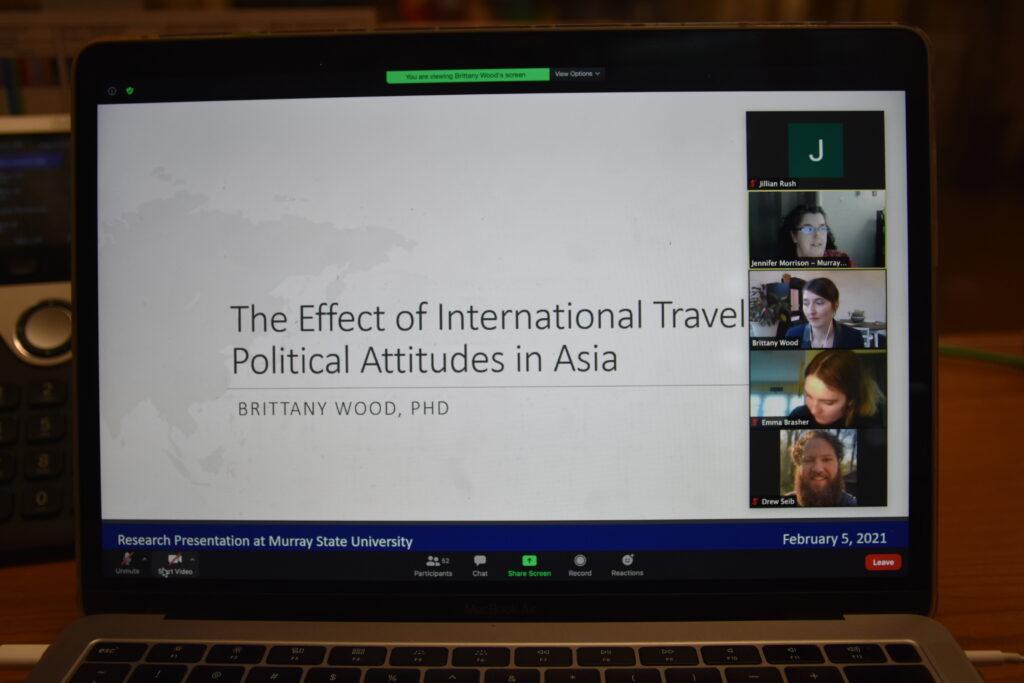Dionte Berry
Features Editor
dberry11@murraystate.edu
After months of working on her research project, assistant political science professor Brittany Wood is sharing her work concerning the effects of international travel on people’s perception of democracy.
Since graduating with her bachelor’s degree from the University of Louisville, Wood has been interested in studying how travel can influence how one looks at their own nation. Wood was inspired to take this path based on her own experiences.
“After I graduated in 2010 I moved to Turkey and I lived in Turkey for about three years and when I was living in Turkey my ideas of politics changed quite significantly because I was able to interact with people from around the world and see Turkish politics,” Wood said.
This led her to research travel in graduate studies at Washington State University. Her dissertation investigated the impact of international travel on political behavior and one’s knowledge, interest and participation in politics.
The connection between travel and politics has been a focus of Wood’s studies and has led her to her project, “The Effect of International Travel on Political Attitudes in Asia,” which she presented on Tuesday, Feb. 9.
Another variable that led Wood to this specific project was the pandemic. She had already gathered the surveys from a previous study, but was dedicating her time to another study that got put on hold because of COVID-19.
“I actually had one study that came to a halt because the people were supposed to leave and travel and I was going to do my experiments, but they weren’t able to,” Wood said. “I picked up this project in December 2020, but I hadn’t really had the time to analyze it and so because of COVID-19 I was able to pick the data back up.”
Wood collected data from the Asian Barometer and took results from 18,000 participants in 12 Asian countries and analyzed questions concerning their perception of democracy and how they feel about it in their home country.
Wood then compared how people feel about their own nation’s democracy based on whether they have traveled abroad.
Being the first time she is sharing her research with the public, Wood felt excited to finally get feedback from faculty and students.
“I am really excited because I started this project in December and I have been working on it at home so I haven’t been able to talk to other people about it,” Wood said. “I want to see what their reactions are, if there are any future directions I can take with it and how I can develop it further.”
Wood is also excited to be talking about an aspect of political science that is relatively new and hasn’t been talked about.
“Travel in general is not a heavily studied topic in political science,” Wood said. “It’s pretty new, so I relish in being able to share my ideas and share my research with anyone that will listen.”
Wood’s colloquium was attended by many students and faculty members; one student in attendance was senior international studies and Spanish double major Daniel Craig.
Craig found Wood’s research insightful as it was something he hadn’t thought about before.
“I had never thought about how traveling might have an affect on how people perceive their own government and democracy,” Craig said. “Now when I do travel, it will definitely be something that I think about.”
Craig initially heard about the colloquium from his friends and thought it would be something worth checking out. His big takeaway was the impact of what travel could have on someone.
“Not only does traveling create a more versed and rounded person, it can also change the way in which we see our own country,” Craig said. “ I can not wait to see what comes next with further research.”
Wood was happy with how her work was received and the diverse range of suggestions and questions she received about her work.
“Colloquiums offer a great opportunity to learn about what people are doing on campus and see what type of research is happening at Murray State,” Wood said. “Even though it’s not this colloquium, whenever there are others check them out to see what their professors and faculty are doing.”


























































































